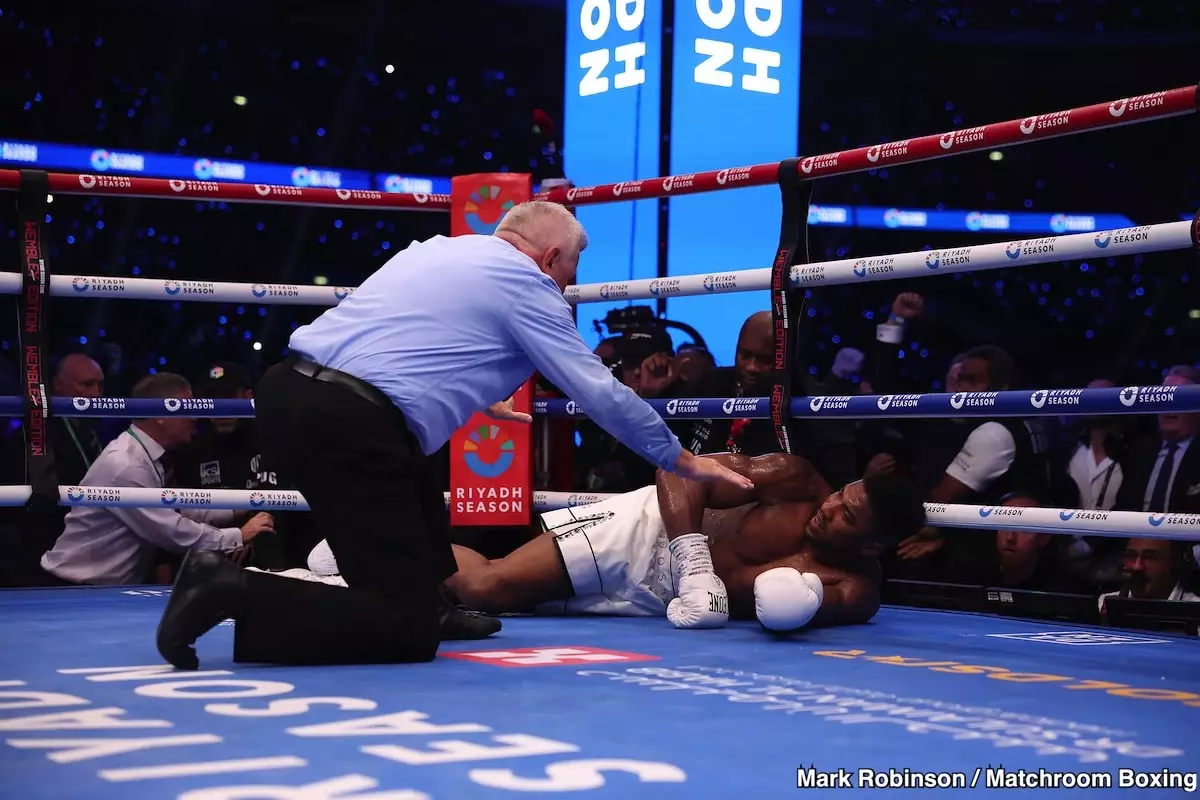BY BOXING HIT STAFF-
Few stories resonate more poignantly than that of Anthony Joshua. Once hailed as the heavyweight champion with a seemingly indomitable spirit, Joshua’s recent encounter with Daniel Dubois has cast a shadow over his illustrious career. This bout, marred by a brutal knockout, serves not only as a testament to the fleeting nature of glory in sports but also opens the floor to discussions about resilience, strategy, and the future of boxing legends who face unexpected adversities. Eddie Hearn’s perspectives on this match reveal a deep well of emotions and can offer crucial insights into what went wrong for the British fighter.
Although the outcome of the fight was disappointing for Joshua and his fans, it is essential to acknowledge the courage he displayed. Eddie Hearn highlighted this tenacity, particularly in Joshua’s ability to rise from the canvas not once, but multiple times. This initial strength was overshadowed by a series of miscalculations and a lack of defensive strategy, as Joshua was dropped on four occasions. The gravity of the first-round knockdown loomed large over the rest of the match. Hearn pointed out that this initial hit essentially reduced Joshua’s combat effectiveness to a mere “30%.” This analogy effectively encapsulates how a single moment can derail an entire fight — a lesson echoed throughout the annals of boxing history.
As the fight progressed, it became increasingly clear that Dubois capitalized on Joshua’s inability to recover from the early onslaught. The seasoned IBF heavyweight champion commanded the ring, showcasing both power and tactical awareness. Hearn’s commentary on the match revealed his belief that the fight was virtually over by the second round due to Joshua’s compromised state. This perspective illustrates a pivotal aspect of professional boxing — the psychology of combat. Once a fighter tastes the bitter flavor of defeat and feels vulnerable, regaining confidence poses an uphill battle.
Joshua’s attempts to regain control in the later rounds were commendable yet ultimately futile. In fact, as Hearn articulately put it, the nature of Dubois’ early dominance meant that any semblance of an even match was quickly fading. Even when Joshua managed to land some impactful shots of his own, notably in the third and fourth rounds, Dubois seemed less wounded and more worn out — his endurance outmatching Joshua’s resilience under pressure. This stark contrast further emphasizes the need for strategic adaptability in high-stakes matches.
In the aftermath of this battle, a looming question remains: What does the future hold for Anthony Joshua? This defeat led many to speculate whether he can regain his status in a world that highly values both experience and performance. Hearn’s remarks suggest a potential shift in thinking; rather than seeking a quick rematch with Dubois, perhaps a more prudent approach would be to recalibrate Joshua’s training and strategy before stepping back into the ring. After all, boxing is as much about mental preparedness as it is about physical prowess.
Critics have been vocal on social media, voicing concerns that this defeat may redefine Joshua’s identity as a fighter. The effective weight of public expectation is heavy, but resilience is often born from adversity. Hearn’s comments, layered with empathy, encourage Joshua not only to reflect on his performance but to appreciate the effort he put forth during the fight. This sentiment can serve as a motivator for the former champion, illustrating that while victories are cherished, the courage to face one’s fears is equally important.
Joshua’s loss to Dubois exemplifies the unpredictable and evolutionary nature of boxing. Just as new fighters emerge with their unique skill sets and strategies, seasoned competitors must also adapt or risk becoming obsolete. The sport constantly evolves; what worked in the past may not suffice in the future. In Joshua’s case, his bulkiness and reliance on sheer power may have hindered his ability to evade and absorb punches effectively against a younger, robust opponent.
The key takeaway from this bout is not simply the loss itself, but the broader implications it holds for both Joshua and the heavyweight division. As fans and analysts decipher the fallout, it’s essential to consider what lessons can be gleaned. Will Joshua rise like a phoenix from the ashes, or will this be his chapter of decline? Either way, the survival of the fittest, fueled by strategic evolution, will dictate the future landscape of boxing — and it remains to be seen which contenders will adapt to claim the throne that Joshua once held.


Leave a Reply